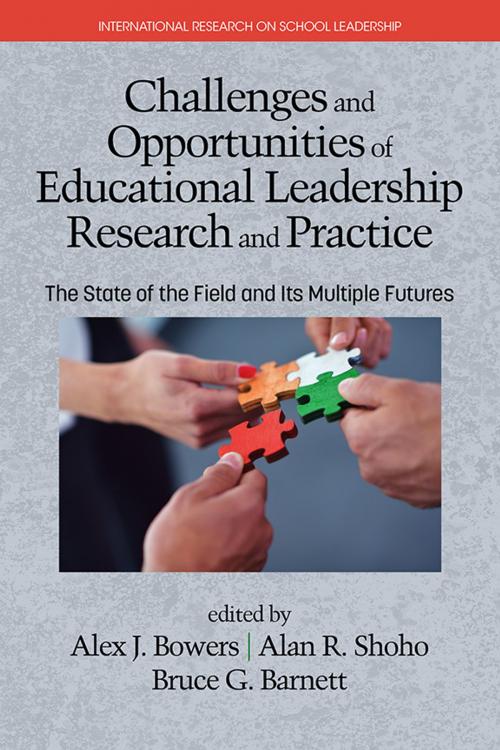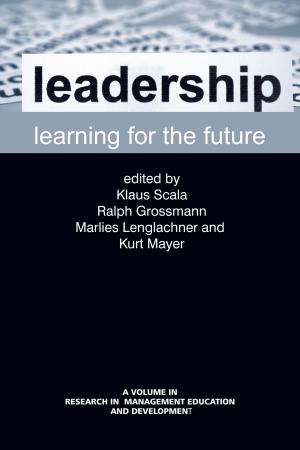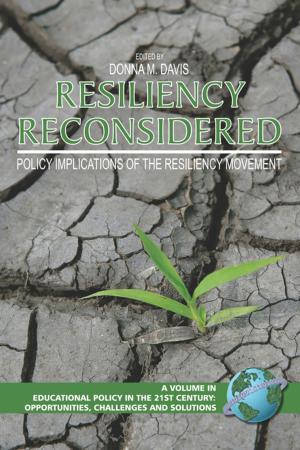Challenges and Opportunities of Educational Leadership Research and Practice
The State of the Field and Its Multiple Futures
| Author: | ISBN: | 9781681232768 | |
| Publisher: | Information Age Publishing | Publication: | September 1, 2015 |
| Imprint: | Information Age Publishing | Language: | English |
| Author: | |
| ISBN: | 9781681232768 |
| Publisher: | Information Age Publishing |
| Publication: | September 1, 2015 |
| Imprint: | Information Age Publishing |
| Language: | English |
As the sixth volume in the International Research on School Leadership series, the contributing authors in this volume consider the history, challenges, and opportunities of the field of research and practice in educational leadership and administration in schools and districts. Ten years after the work of Firestone and Riehl (2005) and their contributing authors, our aim with the present volume was to summarize and update the work of the field, and provide a space to consider the multiple futures of educational leadership in schools and districts, as both challenges and opportunities. The first decade of the twenty?first century brought significant critiques, challenges, and competition to the research and practice of training leaders and administrators of schools and districts around the world. Congruently, the field experienced significant growth and change, as multiple new sub?domains flourished and were founded. Thus, in this volume we were delighted to included excellent chapters from multiple authors that considered the duality of the challenges and opportunities of: The work of the field of educational leadership and administration research to date. The opportunities and challenges of new visions of leadership in traditional and non?traditional schools. The evolving state of research evidence in educational leadership and the increasing sophistication of multiple methodologies, including qualitative research, quantitative modeling, the ability to test theory, and the increasing opportunities brought on by the intersection of data, research, and practice. The preparation of educational leaders. And the emerging trends in the professional development of school leaders. The authors of the nine chapters in the present book volume took on this challenge of confronting the duality of not only including the past as we look to the future, but also the duality of the critique of the field in the midst of exciting and significant progress in our knowledge and understanding of leadership in schools. In the first section of the book (Chapters 2, 3 and 4), the authors examine the interplay of educational leadership research and theory as it relates to reform in schools, especially as it relates to serving historically underserved populations globally. In section 2 (Chapters 5 and 6), the authors highlight the importance of methodological considerations in school leadership research as a means to understand theory and practice as well as providing interesting avenues that point to multiple exciting future possibilities through rely ing on current innovations noted within the chapters. Section 3, (Chapters 7 and 8) examine the research and practice of school leadership preparation, especially as it relates to university?district partnerships and non?traditional school settings. And in the final chapter, (Chapter 9), our capstone contributor provides a means to link the present volume with the past writings on these topics, while also providing a lens to view the exciting possibilities and promises of the multiple futures of the field of educational leadership research and practice.
As the sixth volume in the International Research on School Leadership series, the contributing authors in this volume consider the history, challenges, and opportunities of the field of research and practice in educational leadership and administration in schools and districts. Ten years after the work of Firestone and Riehl (2005) and their contributing authors, our aim with the present volume was to summarize and update the work of the field, and provide a space to consider the multiple futures of educational leadership in schools and districts, as both challenges and opportunities. The first decade of the twenty?first century brought significant critiques, challenges, and competition to the research and practice of training leaders and administrators of schools and districts around the world. Congruently, the field experienced significant growth and change, as multiple new sub?domains flourished and were founded. Thus, in this volume we were delighted to included excellent chapters from multiple authors that considered the duality of the challenges and opportunities of: The work of the field of educational leadership and administration research to date. The opportunities and challenges of new visions of leadership in traditional and non?traditional schools. The evolving state of research evidence in educational leadership and the increasing sophistication of multiple methodologies, including qualitative research, quantitative modeling, the ability to test theory, and the increasing opportunities brought on by the intersection of data, research, and practice. The preparation of educational leaders. And the emerging trends in the professional development of school leaders. The authors of the nine chapters in the present book volume took on this challenge of confronting the duality of not only including the past as we look to the future, but also the duality of the critique of the field in the midst of exciting and significant progress in our knowledge and understanding of leadership in schools. In the first section of the book (Chapters 2, 3 and 4), the authors examine the interplay of educational leadership research and theory as it relates to reform in schools, especially as it relates to serving historically underserved populations globally. In section 2 (Chapters 5 and 6), the authors highlight the importance of methodological considerations in school leadership research as a means to understand theory and practice as well as providing interesting avenues that point to multiple exciting future possibilities through rely ing on current innovations noted within the chapters. Section 3, (Chapters 7 and 8) examine the research and practice of school leadership preparation, especially as it relates to university?district partnerships and non?traditional school settings. And in the final chapter, (Chapter 9), our capstone contributor provides a means to link the present volume with the past writings on these topics, while also providing a lens to view the exciting possibilities and promises of the multiple futures of the field of educational leadership research and practice.















